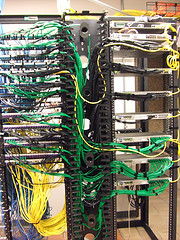World IPv6 Day has Facebook, Google & Yahoo Support


According to The Internet Society, "The goal of the Test Drive Day is to motivate organizations across the industry - Internet service providers, hardware makers, operating system vendors and web companies - to prepare their services for IPv6 to ensure a successful transition as IPv4 addresses run out."
Today, only a few Web sites, ISPs, and CDNs support IPv6. Martin Levy, director of IPv6 strategy for Hurricane Electric, an IPv6 specialist that provides ISP backbone and co-location services, said today that there are only a handful of sites and CDNs that support IPv6. These include Google; Netflix, to a degree; Germany's Heise Online; Facebook at www.v6.facebook.com; and Limelight.
Specifically, the Society hopes World IPv6 Day will "expose potential issues under controlled conditions and address them as soon as possible. The vast majority of users should be able to access services as usual, but in rare cases, mis-configured or misbehaving network equipment, particularly in home networks, may impair access to participating websites during the trial. Current estimates are that 0.05% of users may experience such problems, but participating organizations will be working together with operating system manufacturers, home router vendors and ISPs to minimize the number of users affected. Participants will also be working together to provide tools to detect problems and offer suggested fixes in advance of the trial."
This needs to be done because, again of that chicken and egg problem. It's all well and good for you Web site to support IPv6, but what if your network doesn't support it? What about your end-users? It's all well and good to say that there shouldn't be any problems, but I think we're all smart enough to know that that won't be the case. It never is when you make a major network infrastructure change.
As Donn Lee, a Facebook network engineer, explained on Facebook's page on World IPv6 day, "Testing IPv6 is important because recent studies indicate about 0.05% of Internet users (1 in 2,000) can't reliably connect to websites that enable both IPv4 and IPv6 addresses (known as "dual-stacked" websites. This has resulted in a classic chicken-and-egg puzzle right now: websites don't want to enable IPv6 because a small number of their users may have trouble connecting. At the same time, doing nothing means that ever more users will have trouble connecting to these dual-stacked websites."
Do you want to get involved? You can. You should.
If you run a Website, you can do it by making your site IPv6 accessible using dual stack technology and obtain an AAAA Domain Name System (DNS) record for your site. Your site will should still be available to the IPv4 Internet.
As an ISP, you're going to be participating in this trial one way or the other-it's not like your customers are going to stop trying to use Facebook, Google, and Yahoo. According to the Internet Society, "The most important thing for you to do is to advise your customer support organization. You should have plans in place to explain the event to customers, and to troubleshoot if problems arise. You should consider customer outreach. You may want to post a version of the IPv6 test page on your customer-facing servers, with tips for fixing problems encountered. Once you've done that, you might send notices to customers inviting them to test their service ahead of time. If you provide gateway routers to your customers, you should test their functionality, to make sure user equipment behind them responds appropriately when content is available over dual-stack."
For more information on participating on World IPv6 Day check out the Internet Society How to Join page. If you need more information on how to use IPv6, I highly recommend for anyone working on IPv6 that they read the National Institute of Standards and Technology (NIST)'s Guidelines for the Secure Deployment of IPv6 document. (PDF Link)